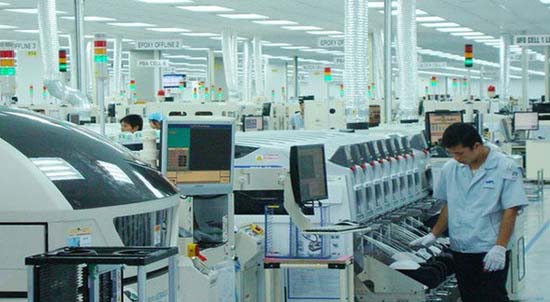Vietnam, Korea expect higher trade, investment cooperation after tax cut
The Hanoitimes – The tax reduction and exemption on various items imported from the Republic of Korea (RoK) from this year will help further boost trade and investment ties between Vietnam and RoK next time.
The Government has recently issued two decrees on Vietnam’s special preferential import tax lists as part of efforts to implement the free trade agreement between Vietnam and the Republic of Korea (VKFTA), and another deal between ASEAN and the RoK (AKFTA). The two decrees became effective on January 1, 2018.
Decree No. 149/2017/ND-CP details preferential taxes of Vietnam to implement the VKFTA while Decree No. 157/2017/ND-CP defines preferential taxes to conduct the ASEAN-RoK Trade in Goods Agreement as part of the AKFTA in 2018-2022.
Under the decrees, more than 700 tariff lines applicable for goods imported from RoK will be cut to zero percent in 2018. Imported goods subject to new import tariffs mainly are seafood, wheat, confectionary products, diesel fuel, jet fuel, paint, laundry detergent, iron and steel products, electrical machinery, and electronics.
According to experts, Vietnamese and Korean firms will enable to exploit the trade and investment incentives that the two countries have offered each other, further strengthening the bilateral cooperation on trade and investment.
After two-year validity of VKFTA, the bilateral economic cooperation between Vietnam and Korea has made positive and strong progress. Vietnam is considered an open market for Korean businesses.
Nguyen Van Toan, Vice Chairman of the Vietnam Association of Foreign Investment Enterprises, said that KoR firms have invested US$8 billion each year in Vietnam in the past four years.
After 25 years of Vietnam and RoK’s economic ties, RoK’s investment capital in Vietnam now increases to some US$60 billion, 120 times higher than that in 1992. Bilateral trade between the two countries also surges 117 times to US$58.5 billion
South Korea’s foreign direct investment (FDI) in Vietnam has occurred in three waves. The first wave occurred after the lifting of the US embargo, which focused on labor-intensive sectors such as textiles and garments, followed by Vietnam ascension to the WTO wherein investors focused on the manufacturing of electronic goods. The third wave currently focuses on manufacturing as well as consumer goods, retail, and services.
Some 5,000 South Korean companies have invested in Vietnam in the last 25 years. According to the Vietnam Chamber of Commerce and Industry, Korean-invested firms in Vietnam in 2016 contributed almost a third of Vietnam’s exports and provided around 700,000 jobs domestically.
Manufacturing accounts for 70 percent of the cumulative South Korean investments since 1988, followed by real estate management and construction sector at 14.8 percent and 5.4 percent respectively.
Apart from manufacturing, which accounted for 82.3 percent of investments in 2016, there has been a growing interest by South Korean companies in the services and distribution sectors along with, wholesale and retail, culture, and science and technology. In addition, 2017 has seen a considerable interest in the food and finance & banking sectors.
South Korean firms are also looking to increase their investments in the agriculture, forestry, and fishery sectors, taking advantage of the preferential tariffs of VKFTA./.
Caption: Korean firms have invested US$8 billion each year in Vietnam in the past four years.
Under the decrees, more than 700 tariff lines applicable for goods imported from RoK will be cut to zero percent in 2018. Imported goods subject to new import tariffs mainly are seafood, wheat, confectionary products, diesel fuel, jet fuel, paint, laundry detergent, iron and steel products, electrical machinery, and electronics.
According to experts, Vietnamese and Korean firms will enable to exploit the trade and investment incentives that the two countries have offered each other, further strengthening the bilateral cooperation on trade and investment.
After two-year validity of VKFTA, the bilateral economic cooperation between Vietnam and Korea has made positive and strong progress. Vietnam is considered an open market for Korean businesses.
Nguyen Van Toan, Vice Chairman of the Vietnam Association of Foreign Investment Enterprises, said that KoR firms have invested US$8 billion each year in Vietnam in the past four years.
After 25 years of Vietnam and RoK’s economic ties, RoK’s investment capital in Vietnam now increases to some US$60 billion, 120 times higher than that in 1992. Bilateral trade between the two countries also surges 117 times to US$58.5 billion
South Korea’s foreign direct investment (FDI) in Vietnam has occurred in three waves. The first wave occurred after the lifting of the US embargo, which focused on labor-intensive sectors such as textiles and garments, followed by Vietnam ascension to the WTO wherein investors focused on the manufacturing of electronic goods. The third wave currently focuses on manufacturing as well as consumer goods, retail, and services.
Some 5,000 South Korean companies have invested in Vietnam in the last 25 years. According to the Vietnam Chamber of Commerce and Industry, Korean-invested firms in Vietnam in 2016 contributed almost a third of Vietnam’s exports and provided around 700,000 jobs domestically.
Manufacturing accounts for 70 percent of the cumulative South Korean investments since 1988, followed by real estate management and construction sector at 14.8 percent and 5.4 percent respectively.
Apart from manufacturing, which accounted for 82.3 percent of investments in 2016, there has been a growing interest by South Korean companies in the services and distribution sectors along with, wholesale and retail, culture, and science and technology. In addition, 2017 has seen a considerable interest in the food and finance & banking sectors.
South Korean firms are also looking to increase their investments in the agriculture, forestry, and fishery sectors, taking advantage of the preferential tariffs of VKFTA./.
Caption: Korean firms have invested US$8 billion each year in Vietnam in the past four years.
Source: http://hanoitimes.com.vn/investment/news/2018/01/81E0C03F/vietnam-korea-expect-higher-trade-investment-cooperation-after-tax-cut/


 Thailand
Thailand




